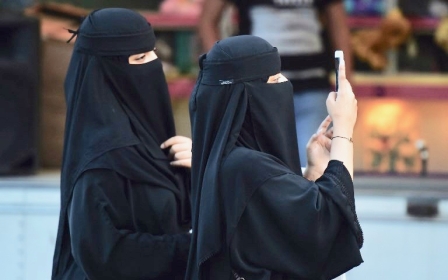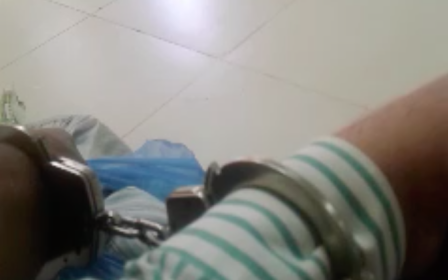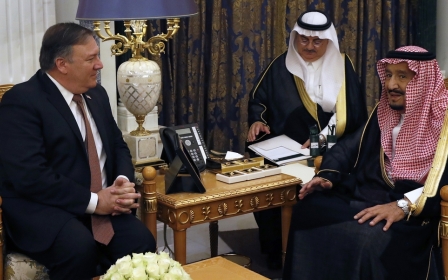Australia mulls Saudi teen's asylum request as UNHCR takes charge of case
Australia said on Tuesday it will "carefully consider" the asylum request of an 18-year-old Saudi woman who is currently in the United Nations' care in Bangkok after fleeing her country and her family.
Rahaf Mohammed al-Qunun was interview by UNHCR, the UN's refugee agency, on Tuesday to check whether she is eligible for asylum, a day after Thailand halted plans to deport her.
The Saudi teen's case has captured worldwide attention after she barricaded herself in a Bangkok hotel room and took to social media saying that she was escaping her ultra-strict family and the conservative laws of Saudi Arabia.
In a number of tweets and videos, Qunun said she feared for her life if she was deported back to Kuwait and into her family's control once more.
Qunun arrived at Bangkok's Suvarnabhumi airport in transit to Australia from Kuwait on Saturday, when she was denied entry by Thai immigration officials and had her passport taken from her.
However, her online appeals successfully drew the attention of the UNHCR, whose representatives escorted her out of her hotel room and into their care on Monday.
"It could take several days to process the case and determine next steps," UNHCR's Thailand representative Giuseppe de Vincentiis said in a statement.
"We are very grateful that the Thai authorities did not send back Ms al-Qunun against her will and are extending protection to her," he said.
Asylum plea
Politicians and activists in Australia and Britain urged their governments to grant asylum to Qunun.
Australian senator Sarah Hanson-Young called on her government, through social media, to issue Qunun an emergency travel document so she could fly to Australia to seek asylum.
The Australian government said it was monitoring the case closely, highlighting that "the claims made by Ms al-Qunun that she may be harmed if returned to Saudi Arabia are deeply concerning", said a spokesperson for the Department of Foreign Affairs and Trade.
"Any application by Ms Al-Qunun for a humanitarian visa will be carefully considered once the UNHCR process has concluded," a Department of Home Affairs official added.
On Tuesday, Qunun's father arrived in Bangkok, but Thai immigration chief Surachate Hakparn said he would have to wait and see whether the UN would allow him to see her.
"The father and brother want to go and talk to Rahaf but the UN will need to approve such talk," Hakparn told reporters.
Qunun 'worried' about father's arrival
Qunun said in a tweet that she was concerned that her father had just arrived in the country. "My father just arrived as I heard witch [sic] worried and scared me a lot and I want to go to another country that I seek asylum in.
"But at least I feel save now under UNHCR protection with the agreement of Thailand authorities. And I finally got my passport back."
The arrival of Qunun's relatives has raised alarm among her supporters.
"The father is now here in Thailand and that's a source of concern," Phil Robertson, Human Rights Watch's deputy director for Asia, told Reuters.
"We have no idea what he is going to do ... whether he will try to find out where she is and go harass her. We don't know whether he is going to try to get the embassy to do that."
Saudi denial
Saudi Arabia has denied it asked Thailand to extradite Qunun, the embassy said on Twitter.
"The Kingdom of Saudi Arabia has not asked for her extradition. The embassy considers this issue a family matter," it said.
Earlier on Monday, Thai officials admitted having contact with the Saudi embassy before her arrival, after previously denying it.
"The Saudi Arabia embassy contacted the immigration police ... and said that the girl had run away from her parents and they fear for her safety," Hakparn, the chief of Thailand's immigration police, told reporters.
"We acknowledged this and checked her paperwork. She had a passport but no return ticket, no travel plan, and no destination or hotel reservation in Thailand ... so per airport security procedures, immigration denied her entry."
Qunun said she had obtained an Australian visa and booked a flight. She said she planned to spend a few days in Thailand so she would not spark suspicion when she left Kuwait.
"When I landed at the airport, someone came and said he would process the [Thai] visa but he took my passport. He came back with what seemed to be airport security and said that my parents objected and said I must return to Saudi Arabia via Kuwait Airways," she said.
She said she believed she was stopped after her family appealed to Kuwait Airways. A spokesman for Kuwait Airways said he had no information about the case.
My family threatens to kill me for the most trivial things
- Rahaf al-Qunun
"My brothers and family and the Saudi embassy will be waiting for me in Kuwait," Qunun said by text and voice message from the hotel late on Sunday.
"They will kill me," she said. "My life is in danger. My family threatens to kill me for the most trivial things."
Asked why she was seeking refuge in Australia, she said: "Physical, emotional and verbal abuse and being imprisoned inside the house for months. They threaten to kill me and prevent me from continuing my education.
"They won't let me drive or travel. I am oppressed. I love life and work and I am very ambitious but my family is preventing me from living."
Her family could not immediately be reached for comment. In her initial social media pleas, Qunun said her family was powerful in Saudi society but she did not identify them.
Saudi Arabia's guardianship system requires women to have permission from a male relative to work, travel, marry and even get medical treatment in some cases.
Another Saudi woman, Dina Ali Lasloom, was stopped in transit in the Philippines in April 2017 when she attempted to flee her family.
An airline security official told activists that Lasloom was heard "screaming and begging for help" as men carried her "with duct tape on her mouth, feet and hands" at the airport.
Middle East Eye propose une couverture et une analyse indépendantes et incomparables du Moyen-Orient, de l’Afrique du Nord et d’autres régions du monde. Pour en savoir plus sur la reprise de ce contenu et les frais qui s’appliquent, veuillez remplir ce formulaire [en anglais]. Pour en savoir plus sur MEE, cliquez ici [en anglais].




